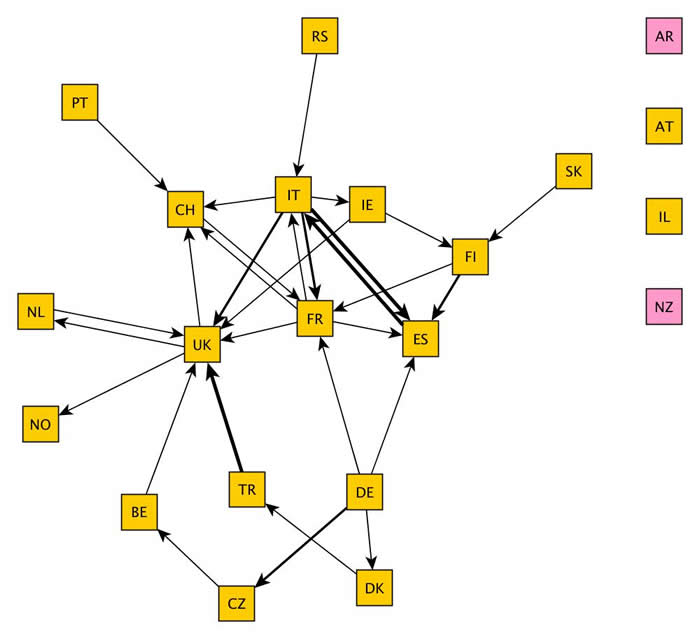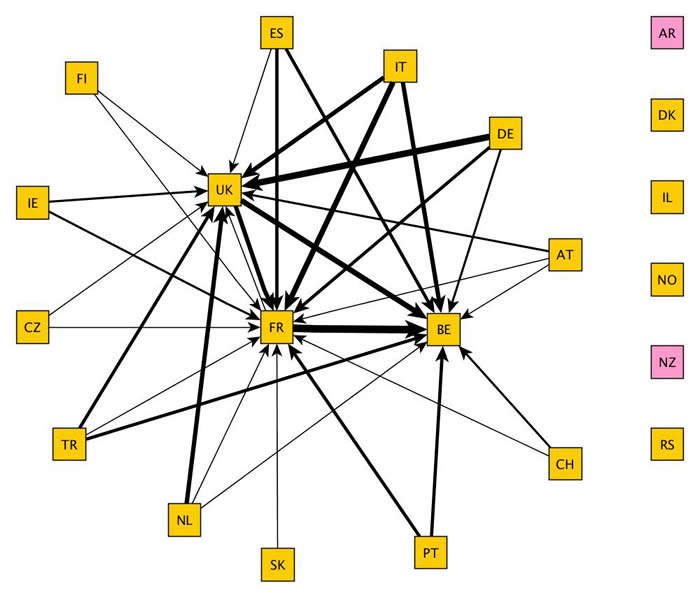
cost-CM1102
Exchange and Training

STSM movement and STSM participating in the three training schools.
The COST action CM 1102 is going to its end. Further down on this page you will find a table listing all researcher who took part in the STSM scheme. However, we were also interested to evaluate how strong our network has been growing over the years.
The table below shows how the STSM researcher where moving within the network. The thickness of the arrow is proportional to the number of people who participated. Orange boxes are participating COST countries and pink boxes are COST International Partner countries. The letters in the boxes relate to the official country codes.

During the course of this COST action, three training schools where offered. The following graphics shows both the location of the training school (BE, FR, UK) and the country where the STSM are conducting their research. Again, the thickness of the arrow is proportional to the number of people who participated. Orange boxes are participating COST countries and pink boxes are COST International Partner countries. The letters in the boxes relate to the official country codes.

STSM awards
Name |
Home Institution |
Host Institution |
Year |
|---|---|---|---|
| Barbara Richichi | Florence (IT) | Grenoble (FR) | 2012 |
| Barbora Fliedrovà | Praha (CZ) | Gent (BE) | 2012 |
| Michela Lomazzi | Parma (IT) | Seville (ES) | 2012 |
| Jani Rahkila | Turku (FI) | Grenoble (FR) | 2012 |
| Jani Rahkila | Turku (FI) | Madrid (ES) | 2012 |
| Giuseppe D'Orazio | Milano (IT) | S.Sebastian (ES) | 2012 |
| Vijayanand Chandrasekaran | Kiel (DE) | Copenhagen (DK) | 2012 |
| Bastian Lange | Aachen (DE) | Praha (CZ) | 2012 |
| Alberto M. Marzaioli | Napoli (IT) | Seville (ES) | 2012 |
| Vanessa Porkilab | Grenoble (FR) | Milano (IT) | 2013 |
| Matteo Gentili | Florence (IT) | Madrid (ES) | 2013 |
| Serge Perez | Grenoble (FR) | S.Sebastian (ES) | 2013 |
| Shahwar I. Jiwani | Nottingham (UK) | Oslo (NO) | 2013 |
| Michele Fiore | Grenoble (FR) | Bristol (UK) | 2013 |
| Thomas Branson | Leeds (UK) | Wageningen (NL) | 2013 |
| Tobias-Elias Gloe | Kiel (DE) | Seville (ES) | 2013 |
| Nikolaos Nikogeorgos | Lyngby (DK) | Istanbul (TR) | 2013 |
| Kevin Buffet | Namur (BE) | Bristol (UK) | 2013 |
| Barbara Richichi | Florence (IT) | Bristol (UK) | 2013 |
| Julio Rodriguez Lavado | Seville (ES) | Milano (IT) | 2013 |
| Ivan Mrkic | Belgrade (RS) | Milano (IT) | 2014 |
| Jesé Reina | Seville (ES) | Florence (IT) | 2014 |
| Ayse Basak | Istambul (TR) | Leeds (UK) | 2014 |
| Luis Felipe | Oeiras (PT) | Berne (CH) | 2014 |
| Marwa Taouai | Amiens (FR) | Berne (CH) | 2014 |
| Sinclair Sweeney | Galway (IE) | Birmingham (UK) | 2014 |
| Antony McDonagh | Galway (IE) | Turku (FI) | 2014 |
| Jani Rahkila | Turku (FI) | Madrid (ES) | 2014 |
| Veronica Baldoneschi | Florence (IT) | Grenoble (FR) | 2014 |
| Thomas Branson | Utrecht (NL) | Leeds (UK) | 2014 |
| Richard Gillis | Nottingham (UK) | Geneva (CH) | 2014 |
| Gaelle Michaud | Berne (CH) | Grenoble (FR) | 2014 |
| Marta Giuliani | Parma (I) | Galway (IE) | 2015 |
| Gianluca Salerno | Florence (I) | Bristol (UK) | 2015 |
| Isabel Wilhelm | Freiburg (D) | Grenoble (F) | 2015 |
| Veronica Baldoneschi | Florence (I) | Basel (CH) | 2015 |
| Dominic Laff | Aachen (DE) | Prague (CZ) | 2015 |
| Tomas Klunda | Bratislava (SK) | Turku (FI) | 2015 |
| Melis Sardan | Ankara (TR) | Leeds (UK) | 2015 |
| Aysun Bulut | Istambul (TR) | Leeds (UK) | 2015 |
| José Reina | Seville (ES) | Florence (IT) | 2015 |
| Marwa Taouai | Amiens (FR) | Milano (IT) | 2015 |
| Isabel Wilhelm | Freiburg (DE) | Grenoble (FR) | 2015 |
STSM are an integral part of our COST action. They provide especially early stage researcher with an excellent opportunity to broaden their skills and experience.
How to apply for a STSM award
One of the important aims of the COST networks is to get researcher connected. The COST actions provide especially for Early Stage Researcher (e.g. PhD students and Postdocs) excellent opportunities to visit other research groups to learn complementary skills or to use techniques that will help the researchers' progress in his or her investigations. The Short Term Scientific Mission award can be used to visit another COST group for the duration of 5 days to 3 months.
STSM awards are a very good addition to your CV. If you are still not convinced, have a look at the statement below from one of the Early Stage Researcher who recently completed his STSM:
"The STSM allowed me to look at my research from a different perspective and sparked interesting discussions on where the project could go. It was also a good experience to visit another lab and take part in another culture. Hopefully I will stay in touch with them for future collaborations."
To access STSM funding one has to apply for it. In the following the application process is detailed and example documents provided.
Here is a pdf-file of the guide produced by the COST office. Applications can be submitted at any time during the life-time of the action.
The following documents are required:
- CV
- A motivation letter. Why is it necessary or beneficial to visit the host partner group?
- A STSM work plan.
- A letter of acceptance from the hosting PI.
- A publication list (if applicable).
- A reference letter from the home PI (supervisor/mentor/line manager).
- The completed STSM application form.
This application process can be done on-line via the COST page. It is important to select the correct Action CM1102.
A successful application will generate a letter of acceptance.
Within four weeks after having completed the visit a report-form has to be submitted.
COST CM 1102/IBCarb - Spring Training School - 9-11 Apr 2015, Bangor/Gwynedd, Wales/UK
Please refer to the event page for details.
COST CM 1102 Winter Training School - 4-6 Nov 2013, Grenoble, France
The Winter Training School was so popular that only a fraction of the people who wanted to participate could be invited. Nevertheless, here you can have a look at some photos taken during the course.
NEWS: Due to the high demand the number of places has been increased!
In November 2013, the Winter Training School "Structural Glycosciences" will give 20 young scientists the opportunity to enhance their knowledge on various techniques that have been developed to characterise the 3D structures of glycans, glycoconjugates and protein-glycoconjugate complexes. This integrative and multidisciplinary workshop will cover current methods for analysing kinetics and thermodynamics of glycoconjugate-protein interactions.
The registration will be limited to 20 people because of the limitations in space at the facilities to be visited (ILL - neutron diffraction, ESRF - synchrotron beam lines, IBS - surface plasmon resonance).
A preliminary programme can be found here.
Deadline for applications: 10 Sept 2013
Documents required: CV, the completed application form and motivation letter from the candidate and a note of support provided by the candidate's supervisor
Elegibility: priority will be given to PhD students, young postdocs
Students who are selected will be contacted by COST in order to confirm their participation.
- non french students will receive a fixed grant of 780 euros to cover travelling, housing and food (list of hotel will be provided)
- french students (out of Grenoble) will receive a fixed grant of 680 euros
- Grenoble students can register for free but will not have priority for the practicals on Tuesday afternoon
Scientific commitee:
Anne Imberty, CERMAV
Serge Pérez, CERMAV
Franck Fieschi, IBS
Organizing committee:
Annabelle Varrot, CERMAV
Olivier Renaudet, DCM
Antoine Royant, IBS
Venue: ESRF / ILL / IBS / CERMAV
Contact: anne.imberty@cermav.cnrs.fr
Opportunities (mainly PhD and post-doctoral positions)
...check also the NEWs section of this webpage.
New opportunities:
No current opportunity has been posted, please come back later!
Job opportunities listed below are out-dated and kept for your information only.
Marie Curie PhD Fellowship in the field of glyco-chemistry of tumours (Early stage researcher or 0-4 yrs, Post graduate, UCD - Dublin, Ireland)
Application dead-line: August 4, 2013 (Sorry for but please NOTE the short dead-line)
Start date: September 1, 2013
We invite applications for a PhD position at the UCD School of Chemistry and Chemical Biology at University College Dublin, Ireland. The PhD student position is available for students with a Chemistry degree (or similar) to develop their skills within the EU Initial Training Network FP7-GLYCOPHARM, a multidisciplinary and competitive training programme in the glycobiology of human tumours.
Job Description: Synthesis and development of lead galectin-blocking compounds, including mono- and oligosaccharide ligands. The project will provide the ESR with a state of the art expertise in synthetic carbohydrate chemistry as well as conjugation techniques, with training in spectroscopic and separation techniques as important integral parts. Secondments with other partners of the network to provide complementary training in molecular design, biological screening of the compounds, chemo-enzymatic synthesis of oligosaccharides, combined with industrial experience and advanced MS analysis will be targeted.
Research Fields: Life Sciences- Chemistry
Benefits:Gross annual salary will be 41,458 €. Allowance to cover expenses linked to the personal household, relocation and travel expenses of the researcher and her/his family in the host country will be 764 € for researchers without a family and 1091 € for researchers with a family.
Further information about the project and the collaborative partners can be found here: www.glycopharm.eu
The position is advertised on http://ec.europa.eu/euraxess/index.cfm/jobs/index
Contact person: Professor Stefan Oscarson (stefan.oscarson@ucd.ie)
Marie Curie ITN "GLYCOPHARM" Early Stage Researcher position (Madrid, Spain)
A Marie Curie ITN "GLYCOPHARM" Early Stage Researcher position (3-year contract) in Computational Chemical Biology Faculty of Pharmacy, Universidad CEU San Pablo, Madrid-Spain, is available.
Detailed information can be found in this pdf document.
The contact is Sonsoles Martin-Santamaria (smsantamaria@ceu.es) and the deadline for the application is set to the 10th of February 2013.
Wageningen University
PhD student on the topic of Microbial Carbohydrates in the area of Organic Chemistry & Chemical Biology (Wageningen University). More information can be found in this pdf document.
Dynano-CIB CSIC – PhD student position
Job Title: Ph D in the field of “NMR and molecular recognition studies applied to Dynamic Interactive Nanosystems”
Job Summary (English, max 1000 characters)
The PhD candidate will be involved in a multidisciplinary project within the molecular recognition field. In particular, he/she will focus on the applications of state-of-the-art NMR methods to investigate biomolecular conformation, structure, and dynamics, of a variety of ligands, as well as on the specific molecular recognition events that take place between them with specific receptors. During the last few years, the group has determined the solution 3D structure of different proteins and thrir complexes using a protocol based on NMR spectroscopy, assisted by molecular mechanics and dynamics calculations. This methodology will be applied to different molecular complexes and to the elucidation of the structure of protein receptors of biomedical interest.
Role: Experimental NMR studies of molecular recognition events. Molecular modelling protocols for understanding interactions at the atomic level.
MARIE CURIE FELLOWSHIP OFFERED
Madrid, Spain
A PhD position is available for an Early Stage Researcher in the framework of the Marie Curie Initial Training Network DYNANO (Dynamic Interactive Nanosystems).
Summary: 36-month position at the Rocasolano Institute of Physical Chemistry (Spanish National Research Council, CSIC) for an Early Stage Researcher in the framework of the ITN DYNANO. DYNANO’s scientific objective is the design, evaluation and optimization of functional nanosystems of biomedical and biotechnological interest. Research activities at the Rocasolano Institute will be focussed on lectin-carbohydrate systems of biomedical relevance. In particular, the work to be carried out involves the development and application of new microarray platforms, from lectin to cell microarrays, and the testing of the assembling, organization and functionality of lectin/carbohydrate-bearing nanosystems, including naturally occurring extracellular vesicles (in collaboration with the Membrane Nanovesicle Research Group from the Department of Genetics of the Semmelweis University, Budapest, Hungary).

